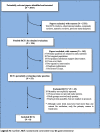Early oral protein-containing diets following elective lower gastrointestinal tract surgery in adults: a meta-analysis of randomized clinical trials
- PMID: 33752757
- PMCID: PMC7986268
- DOI: 10.1186/s13741-021-00179-3
Early oral protein-containing diets following elective lower gastrointestinal tract surgery in adults: a meta-analysis of randomized clinical trials
Abstract
Background: Although current guidelines make consensus recommendations for the early resumption of oral intake after surgery, a recent comprehensive meta-analysis failed to identify any patient-centered benefits. We hypothesized this finding was attributable to pooling studies providing effective protein-containing diets with ineffective non-protein liquid diets. Therefore, the aim of this paper was to investigate the safety and efficacy of early oral protein-containing diets versus later (traditional) feeding after elective lower gastrointestinal tract surgery in adults.
Methods: PubMed, Embase, and the China National Knowledge Infrastructure databases were searched from inception until 1 August 2019. Reference lists of retrieved studies were hand searched to identify randomized clinical trials reporting mortality. No language restrictions were applied. Study selection, risk of bias appraisal and data abstraction were undertaken independently by two authors. Disagreements were settled by obtaining an opinion of a third author. Majority decisions prevailed. After assessment of underlying assumptions, a fixed-effects method was used for analysis. The primary outcome was mortality. Secondary outcomes included surgical site infections, postoperative nausea and vomiting, serious postoperative complications and other key measures of safety and efficacy.
Results: Eight randomized clinical trials recruiting 657 patients were included. Compared with later (traditional) feeding, commencing an early oral protein-containing diet resulted in a statistically significant reduction in mortality (odds ratio [OR] 0.31, P = 0.02, I2 = 0%). An early oral protein-containing diet also significantly reduced surgical site infections (OR 0.39, P = 0.002, I2 = 32%), postoperative nausea and vomiting (OR 0.62, P = 0.04, I2 = 37%), serious postoperative complications (OR 0.60, P = 0.01, I2 = 25%), and significantly improved other major outcomes. No harms attributable to an early oral protein-containing diet were identified.
Conclusions: The results of this systematic review can be used to upgrade current guideline statements to a grade A recommendation supporting an oral protein-containing diet commenced before the end of postoperative day 1 after elective lower gastrointestinal surgery in adults.
Keywords: Elective surgery; Meta-analysis; Mortality; Postoperative nutrition; Protein.
Conflict of interest statement
Figures




Similar articles
-
Early versus traditional postoperative oral feeding in patients undergoing elective colorectal surgery: a meta-analysis of randomized clinical trials.Dig Surg. 2013;30(3):225-32. doi: 10.1159/000353136. Epub 2013 Jul 6. Dig Surg. 2013. PMID: 23838894
-
The effectiveness of non-invasive complementary therapies in reducing postoperative nausea and vomiting following abdominal laparoscopic surgery in women: a systematic review.JBI Libr Syst Rev. 2009;7(19):850-907. doi: 10.11124/01938924-200907190-00001. JBI Libr Syst Rev. 2009. PMID: 27819924
-
Evidence for early oral feeding of patients after elective open colorectal surgery: a literature review.J Clin Nurs. 2006 Jun;15(6):696-709. doi: 10.1111/j.1365-2702.2006.01389.x. J Clin Nurs. 2006. PMID: 16684165 Review.
-
Early versus traditional postoperative feeding in patients undergoing resectional gastrointestinal surgery: a meta-analysis.JPEN J Parenter Enteral Nutr. 2011 Jul;35(4):473-87. doi: 10.1177/0148607110385698. Epub 2011 May 31. JPEN J Parenter Enteral Nutr. 2011. PMID: 21628607
-
The Efficacy of Postoperative Iron Therapy in Improving Clinical and Patient-Centered Outcomes Following Surgery: A Systematic Review and Meta-Analysis.Transfus Med Rev. 2018 Apr;32(2):89-101. doi: 10.1016/j.tmrv.2017.10.002. Epub 2017 Oct 22. Transfus Med Rev. 2018. PMID: 29126577
Cited by
-
PERIOPERATIVE CARE IN DIGESTIVE SURGERY: THE ERAS AND ACERTO PROTOCOLS - BRAZILIAN COLLEGE OF DIGESTIVE SURGERY POSITION PAPER.Arq Bras Cir Dig. 2024 May 6;37:e1794. doi: 10.1590/0102-672020240001e1794. eCollection 2024. Arq Bras Cir Dig. 2024. PMID: 38716919 Free PMC article.
-
Optimized perioperative management (fast-track, ERAS) to enhance postoperative recovery in elective colorectal surgery.GMS Hyg Infect Control. 2022 Jun 23;17:Doc10. doi: 10.3205/dgkh000413. eCollection 2022. GMS Hyg Infect Control. 2022. PMID: 35909653 Free PMC article. Review.
-
EARLY REFEEDING AFTER COLORECTAL CANCER SURGERY REDUCES COMPLICATIONS AND LENGTH OF HOSPITAL STAY.Arq Bras Cir Dig. 2025 Jan 20;37:e1854. doi: 10.1590/0102-6720202400060e1854. eCollection 2025. Arq Bras Cir Dig. 2025. PMID: 39841760 Free PMC article.
-
The Critical Role of Nutrition and Exercise: Optimization in the Patient With Cancer.J Adv Pract Oncol. 2022 Apr;13(3):270-274. doi: 10.6004/jadpro.2022.13.3.18. Epub 2022 May 23. J Adv Pract Oncol. 2022. PMID: 35663166 Free PMC article.
-
Current practice of postoperative fasting: results from a multicentre survey in China.BMJ Open. 2022 Jul 8;12(7):e060716. doi: 10.1136/bmjopen-2021-060716. BMJ Open. 2022. PMID: 35803620 Free PMC article.
References
-
- Cao A. Application of early intestinal nutrition after colon and rectal cancer. Today Nurse. 2009;9:42–43.
LinkOut - more resources
Full Text Sources
Other Literature Sources

